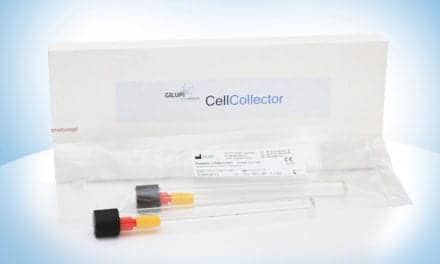In a recent study of noninvasive prenatal testing using cell-free DNA compared to standard prenatal aneuploidy screening in a general obstetrical population, the noninvasive test significantly reduced the rate of false-positive results for the detection of fetal trisomies 21 and 18.
The study examined the performance of the verifi prenatal test by Illumina, San Diego, a noninvasive blood test that analyzes DNA found in a pregnant woman’s blood to detect the most common fetal chromosome abnormalities, including Down syndrome (trisomy 21 or T21), Edwards syndrome (trisomy 18 or T18), Patau syndrome (trisomy 13 or T13), and sex chromosome abnormalities.
In addition to finding a reduced rate of false positives, the study demonstrated that the verifi test performs consistently well in all pregnant women, regardless of their risk level for fetal aneuploidy.
The results of the study, “DNA Sequencing versus Standard Prenatal Aneuploidy Screening,” appeared in the February 27 issue of the New England Journal of Medicine. The full article can also be accessed via the website for verifi.
“The study reflects the diverse clinical screening practices and ethnic variation present throughout the United States, and effectively answers questions from the medical and scientific communities regarding the positive predictive value (PPV) of the verifi prenatal test in the general obstetric population,” said Diana W. Bianchi, MD, executive director of the mother infant research institute at Tufts Medical Center, and lead author of the publication.
“In addition to the significant increase in PPV, the study shows similar fetal fraction distributions in both high- and low-risk pregnant women,” Bianchi added. “Thus, from both a biological and technical perspective, the verifi prenatal test performs well in pregnant women of all risk levels.”
The prospective, multicenter, blinded study analyzed samples from 1,914 pregnant women (mean age 29.6 years) at all risk levels for fetal chromosome abnormalities. The false-positive rate for detection of trisomy 21 with the verifi prenatal test was significantly lower than conventional standard screening (6/1909, 0.3%, versus 69/1909, 3.6%, p<0.0001). For trisomy 18, the verifi prenatal test also demonstrated a lower false-positive rate when compared to standard testing (3/1905, 0.2%, versus 11/1905, 0.6%, p=0.0325).
Importantly, the study showed a tenfold improvement in the PPV for the verifi prenatal test (45.4%) when compared to standard screening for trisomy 21 (4.2%), and a fivefold improvement in PPV for trisomy 18 (40% versus 8.3%). Both the verifi prenatal test and standard screening correctly detected all cases of trisomies 21 and 18. For all of the women enrolled in the study, pregnancy outcome and neonatal follow-up data were obtained, including physical examinations and karyotypes, if performed.
“The results of this study demonstrate that the verifi prenatal test could significantly improve clinical practice by reducing the number of invasive procedures needed to clarify false-positive results obtained with standard screening,” said Richard Rava, PhD, vice president of research and development for reproductive and genetic health at Illumina. “In this study using the verifi prenatal test, we have shown a tenfold improvement in the PPV for trisomy 21 over conventional screening methods.
“Importantly, the performance of noninvasive prenatal testing using cell-free DNA in a general obstetric population, representative of contemporary clinical practice in the United States, is equivalent to previously demonstrated performance in high-risk pregnant women,” Rava added.
Illumina’s reproductive and genetic health solutions use next-generation sequencing technology and advanced microarrays to generate comprehensive, accurate genomic information to assist healthcare providers and patients in making informed decisions for their reproductive health and well-being. Illumina offers the noninvasive verifi prenatal test in its CLIA-certified, CAP-accredited clinical services laboratory to detect chromosome abnormalities and aberrations with improved resolution for consistent and dependable results.






